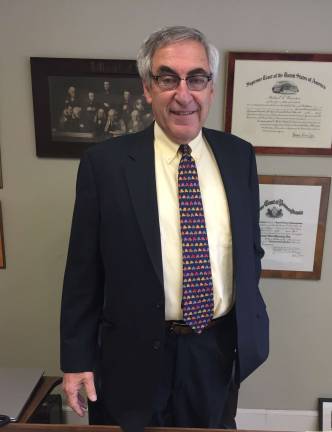The death penalty — two views: Tonkin and Weinstein


BY MARILYN ROSENTHAL
MILFORD — With all the attention the recent trial of Eric Frein has received, questions about the death penalty in Pennsylvania have been raised again, not only in Pike County, but across the state, and even nationally among law enforcement officers, attorneys, civil rights groups, and the general public.
As might be expected, the views of District Attorney Ray Tonkin and Defense Attorney Michael Weinstein, the prosecution and defense respectively in the Frein case, represent two ends of the spectrum.
A brief history and current status of the death penalty in PennsylvaniaIn December of 2011, the Pennsylvania State Senate adopted Senator Greenleaf's Senate Resolution 6 establishing a bi-partisan task force and advisory committee to conduct a study of capital punishment in the Commonwealth.
When Gov. Tom Wolf took office in 2015, he announced that he would put all executions on hold until the committee released its report. The committee has not yet released its report. Meanwhile, Wolf has been issuing reprieves on an individual case basis.
The Pennsylvania Supreme Court in Dec. 2015 upheld Wolf's constitutional authority to grant temporary reprieves to inmates on death row. Thus far, he has reprieved five convicted killers scheduled for execution.
There are currently 185 inmates on death row in Pennsylvania.
The death penalty remains the law of the Commonwealth of Pennsylvania.
Tonkin's viewRay Tonkin believes that there is no legal standing for the governor's moratorium on the death penalty. He recently said in an interview with the Courier, "The death penalty has not been removed from the law of the Commonwealth. The will of the citizenry is reflected by jurors who, after proper instruction by a court, have unanimously determined that the appropriate sentence under the law is a sentence of death."
Does he believe the death penalty deters crime?
"In my opinion, the death penalty deters crime and serves as the appropriate punishment of certain criminal offenders," Tonkin said.
Tonkin acknowledged that Eric Frein's case will go through numerous appeals and may not be finalized for at least a decade.
Responding to the question of whether the current debate on the death penalty is political or whether there are substantive issues which can be debated, Tonkin replied,
"It's a political issue only because the legislature has to vote on it."
In Tonkin's view, the death penalty is the only answer to full justice, which is what he asked the jury to deliver in the Frein case.
Weinstein's viewMichael Weinstein believes that Gov. Wolf has the right to grant reprieves since the committee has not yet responded. Weinstein is against the death penalty for a whole range of moral and ethical reasons. He thinks the legislators who created the death penalty were not and are not qualified to do so.
Responding to the question of appeals in the Frein case, Weinstein pointed out that appeals will focus on the guilt phase and the sentencing phase separately, as well as the whole case in general.
Responding to the question of whether the current death penalty debate is political, he said, "The current Republican party seems to favor the death penalty. Politics will govern, but it is sentiment that tries to inform politics. It is important to distinguish between a political label and a moral label."
William Ruzzo, Weinstein's co-counsel in the defense of Frein, said, "It is an honor to be defending a case against the death penalty. I do this to honor my mother, who was an ardent opponent of the death penalty."
In closing, Weinstein said, "Unequivocally, the government should not be in the business of killing its citizens."